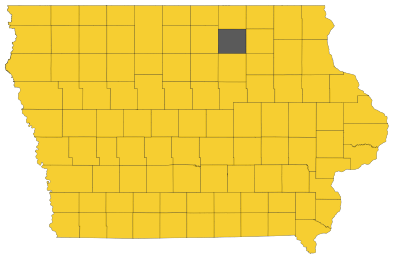201 University of Iowa alumni live in Floyd County.
Students, faculty and staff at the University of Iowa come from all of Iowa’s 99 counties. While the students stay on campus only for a short period, the influence they have back in their communities lasts a lifetime. These are the doctors, nurses, librarians, lawyers, pharmacists and much more that you interact with every day. By utilizing the education and experiences they received at the University of Iowa, your Hometown Hawkeyes are able to create a positive economic impact within their hometowns and across the state.

Did you know UI practicing alumni in Floyd County include:
4
Physicians
3
Dentists
10
Nurses
6
Pharmacists
Other alumni in Floyd County include:
33
Business
26
Education
5
Engineering
102
Liberal Arts & Sciences
31
Graduate College
2
Public Health
11
Law
UI Students from Floyd County
There are 34 students from Floyd County currently enrolled at the University of Iowa.| Tippie College of Business | 2 |
|---|---|
| College of Engineering | 3 |
| Graduate College | 2 |
| College of Law | 1 |
| College of Liberal Arts & Sciences | 21 |
| College of Medicine | 2 |
| College of Nursing | 2 |
| College of Pharmacy | 1 |
How the UI impacts your neighborhood in Floyd County
Last year, the UI supported 1 local companies with purchases of $500.
PreK-12 students were engaged in UI Health Care STEM Education Programs in Floyd County.
Healthcare Connections in Floyd County
Patient Visits to The University of Iowa Hospitals and Clinics: 2,087
Number of tests performed by the State Hygienic Lab: 2,252
1,193 clinical tests. The primary mission of the Disease Control Division is to test human specimens, food and water for diseases of public health significance to protect the citizens of Iowa.
388 environmental tests. The Environmental Health Division routinely monitors private and public drinking water, private wells, streams and lakes, wastewater, air, soil and food for contaminants of potential environmental and public health concern.
671 newborn screenings. The Newborn Screening section identifies infants at risk for more than 50 inherited conditions by testing a small blood spot obtained from a simple heel-stick shortly after birth.